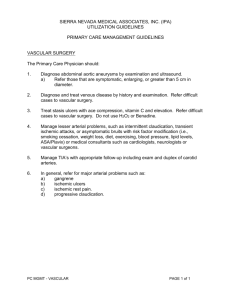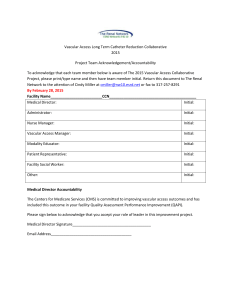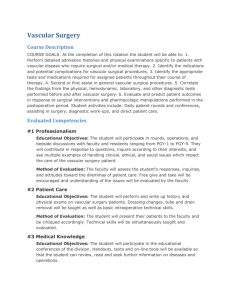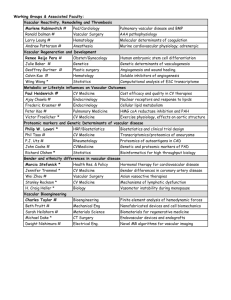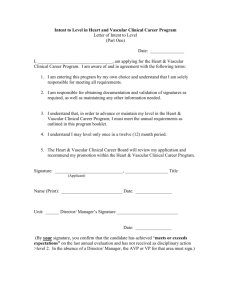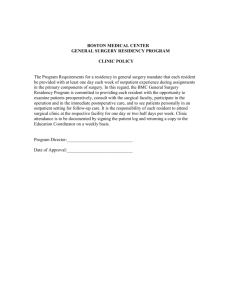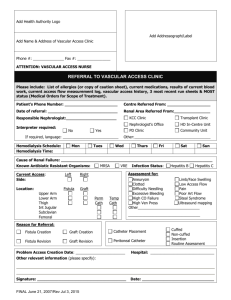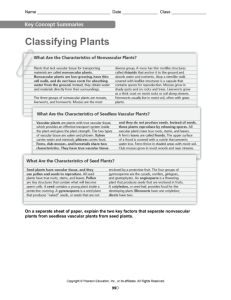PGY 1 - St. Luke`s Roosevelt Hospital Center, Department of Surgery
advertisement
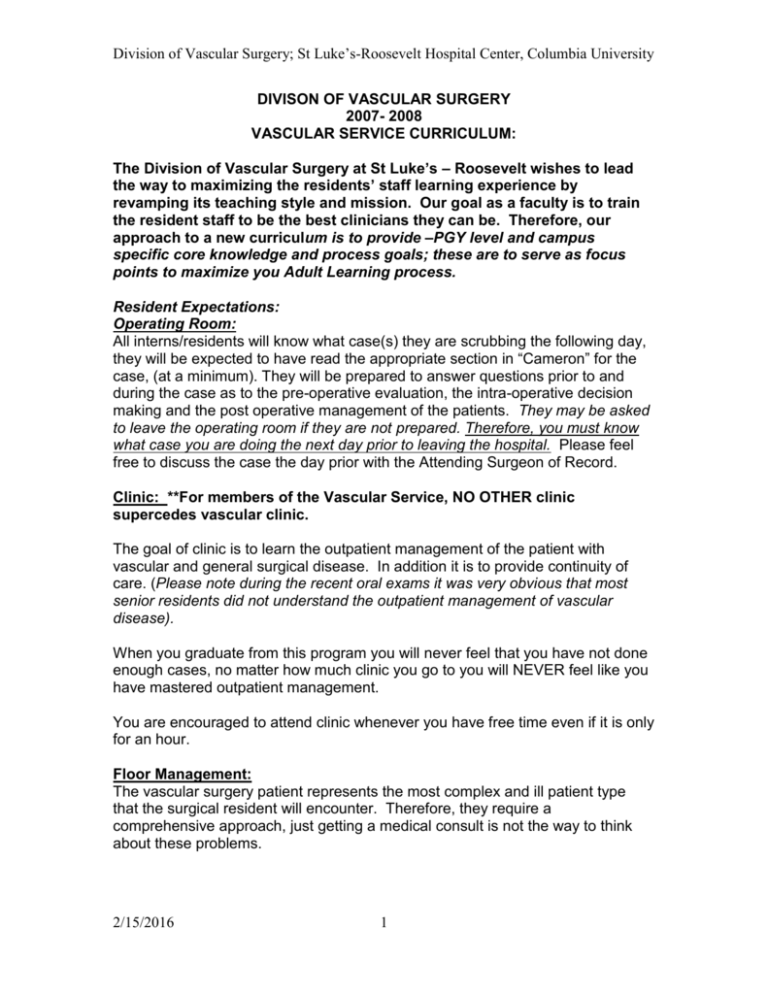
Division of Vascular Surgery; St Luke’s-Roosevelt Hospital Center, Columbia University DIVISON OF VASCULAR SURGERY 2007- 2008 VASCULAR SERVICE CURRICULUM: The Division of Vascular Surgery at St Luke’s – Roosevelt wishes to lead the way to maximizing the residents’ staff learning experience by revamping its teaching style and mission. Our goal as a faculty is to train the resident staff to be the best clinicians they can be. Therefore, our approach to a new curriculum is to provide –PGY level and campus specific core knowledge and process goals; these are to serve as focus points to maximize you Adult Learning process. Resident Expectations: Operating Room: All interns/residents will know what case(s) they are scrubbing the following day, they will be expected to have read the appropriate section in “Cameron” for the case, (at a minimum). They will be prepared to answer questions prior to and during the case as to the pre-operative evaluation, the intra-operative decision making and the post operative management of the patients. They may be asked to leave the operating room if they are not prepared. Therefore, you must know what case you are doing the next day prior to leaving the hospital. Please feel free to discuss the case the day prior with the Attending Surgeon of Record. Clinic: **For members of the Vascular Service, NO OTHER clinic supercedes vascular clinic. The goal of clinic is to learn the outpatient management of the patient with vascular and general surgical disease. In addition it is to provide continuity of care. (Please note during the recent oral exams it was very obvious that most senior residents did not understand the outpatient management of vascular disease). When you graduate from this program you will never feel that you have not done enough cases, no matter how much clinic you go to you will NEVER feel like you have mastered outpatient management. You are encouraged to attend clinic whenever you have free time even if it is only for an hour. Floor Management: The vascular surgery patient represents the most complex and ill patient type that the surgical resident will encounter. Therefore, they require a comprehensive approach, just getting a medical consult is not the way to think about these problems. 2/15/2016 1 Division of Vascular Surgery; St Luke’s-Roosevelt Hospital Center, Columbia University On a daily basis each patient’s problem list needs to be reviewed, and more importantly acted upon. Abnormal lab values need to be corrected, or addressed as to why they are not being corrected. Fluid status and wounds need to be assessed daily. Antibiotics need to be chosen based on objective data. It is the responsibility of the senior resident to make sure that the junior resident understands the medical management of each patient, and the junior resident instructs the interns. Notes: The daily progress note on the Vascular patient should state at the top: Hospital day/Post operative day Anti-biotic day (and what anti-biotic) The labs are to included in the daily note These are not chores these are opportunities to learn. In addition it is the residents job to ask; why is this patient in the hospital, what am I doing to get them better today…..the answer to this should be reflected in the note. ROOSEVELT HOSPITAL: Clinic occurs on Tuesdays in 5G77, 9 am – 4 pm. This clinic is staffed by Dr. Lantis. There is also vascular office on Monday and Wednesday in 5G77 staffed by Dr. Todd. (Attendance in Clinic on Monday and Wednesday is by arrangement with Dr Todd) ST LUKE’S HOSPITAL: Monday Clinic – 12th Floor 1090 Amsterdam 9- 5 – Dr Benvenisty Wednesday Clinic – 12th Floor 1090 Amsterdam 10- 3 Dr Benvenisty Thursday Clinic – 7th Floor 1090 Amsterdam 11 – 4 Dr Mendes Friday Clinic – 12th Floor 1090 Amsterdam – 9- 4 – Dr Lantis Walk Rounds/Teaching Rounds: At present there is no formal walk round schedule. Attendings and residents are encouraged to find each other and make co-joined rounds on patients as their schedules permit. As vascular attending and coverage staff grows we will try to formalize at least a weekly – campus walk round schedule. Vascular Conference: This educational conference remains weekly on Tuesday Morning from 7-7:45 AM. This conference is designed to be RESIDENT DRIVEN, meaning that cases and topics that the residents have recently encountered are to be a used as the fulcrum for discussion. 2/15/2016 2 Division of Vascular Surgery; St Luke’s-Roosevelt Hospital Center, Columbia University Final Exam: In order to make sure that the educational goals of the individual on each rotation are being met a final exam for the Vascular Rotation at all levels has been added. The goal of this curriculum is to prepare the resident for the ABSITE and Mock Orals (with the ultimate goal being first time passage of the ABS Certifying and Qualifying exam). All interns/residents will have a 30-minute exam at the end of their rotation (by appointment) with one of the Vascular Attending Staff. This exam will consist of 10 written, SESAP/ABSITE style, level appropriate questions (10 minutes to complete); and one or two level appropriate oral exam questions. From this a grade as part of your valuation for the rotation will be forwarded to the Residency Program Director. 2/15/2016 3 Division of Vascular Surgery; St Luke’s-Roosevelt Hospital Center, Columbia University CORE CURRICULUM: (By “Cameron” Chapter Headings and Page Number) St Luke’s Campus PGY 4/PGY 3/ PGY 1 Senior Resident Tibioperoneal Arterial Occlusive disease 781 Axillofemoral bypass 792 Peripheral Arterial Occlusive Disease: Angioplasty, Stenting, and Endovascular Graft Treatment 797 Infected Vascular Graft 808 Peripheral artery embolus 817 Consult Resident Vascular Access 828 False aneurysm and Arteriovenous fistula 741 Buerger’s Disease 821 Vascular Trauma- 984 Penetrating Neck Trauma 1018 Necrotizing Infections of the Skin and Soft Tissue1082 Gas gangrene of the extremity 1079 Extremity Compartment syndrome 989 Intern Skin lesions: Evaluation, Diagnosis and Management 1043 Nerve injury 1066 Varicose Veins 864 Venous reconstruction 871 Gangrene of the Foot 813 Management of Lymphedema 2/15/2016 4 Division of Vascular Surgery; St Luke’s-Roosevelt Hospital Center, Columbia University Roosevelt Campus PGY 5/PGY 4/ PGY 2/PGY 1 Chief Resident – A Rotation Abdominal Aortic Aneurysm: Open Repair 703 Abdominal Aortic Aneurysm: Endovascular repair 709 Abdominal Aortic Aneurysm and Unexpected Abdominal Pathology 718 Brachiocepahlic reconstruction 758 Profunda Femora Reconstruction 789 Chief Resident – B Rotation Thoracoabdominal Aneurysms 723 Acute Aortic Dissection and its Complications 729 Upper Extremity Occlusive Disease 801 Acute mesenteric Ischemia 846 Chronic Mesenteric Ischemia 849 Atherosclerotic Renovascular Disease 831 Senior Resident Ruptured Abdominal Aortic Aneurysm 713 Transperitoneal vs. Retroperitoneal Approach to the Aorta 721 Popliteal and femoral artery aneurysms 732 Carotid endarterectomy 747 Recurrent Carotid Stenosis 751 Balloon Angioplasty and Stents in Carotid Occlusive Disease 755 Aneurysms of the Extracranial Carotid and vertebral Arteries 762 Thoracic Outlet Syndrome 840 Reynaud’s Syndrome 838 Consult Resident Nonoperative treatment of claudication 768 Aortoiliac Occlusive Disease 772 Femoropopliteal Occlusive Disease 777 Cardiovascular pharmacology 1141 Acute renal failure 1147 Coagulopathy in the critically ill patient 1184 Peripheral Arterial and Bypass Graft Occlusion: Thrombolytic Therapy 824 Pulmonary Thromboembolism 876 Vena Cava Filter Placement 879 Intern Fluid and electrolyte therapy 1087 Pre-operative assessment of the elderly patient 1101 Perioperative care and monitoring of the surgical patient 1105 Prevention of Venous Thromboembolism in the Surgical Patient 884 2/15/2016 5 Division of Vascular Surgery; St Luke’s-Roosevelt Hospital Center, Columbia University Surgical site infections 1118 The diagnosis of Venous Insufficiency 860 Deep Venous Thrombosis 869 2/15/2016 6 Division of Vascular Surgery; St Luke’s-Roosevelt Hospital Center, Columbia University 2/15/2016 7 Division of Vascular Surgery; St Luke’s-Roosevelt Hospital Center, Columbia University AWARDS Three awards will be given out by the Division of Vascular Surgery to reward outstanding achievement while on the Vascular Surgery Rotation. The recipients will be agreed upon by the Vascular Surgery Attending Staff. Appropriate patient management, informed input to clinical and operative care, participation in conference and teaching rounds, and active participation in clinic are considered the minimum requirements. The recipient of any of the award(s) may be planning to pursue a career in any subspecialty, NOT only vascular surgery. Each recipient will be announced at the year-end dinner and the will be able to add the commendation under Awards Section of their Curriculum Vitea. Outstanding Vascular Senior Resident: 1-year subscription to Journal of Vascular Surgery Outstanding Vascular Consult Resident: 1-year subscription to Annals of Vascular Surgery Outstanding Vascular Intern: 1-year subscription to Wound Repair and Regeneration 2/15/2016 8
